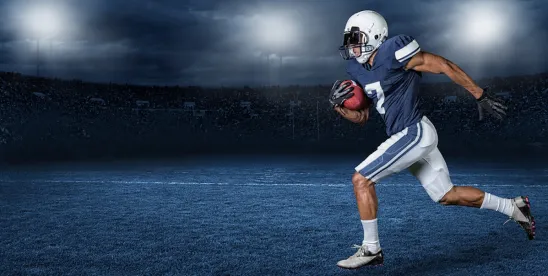College athletics in the United States underwent a substantial change in July of 2021 after individual states began enacting laws to permit student-athletes to legally monetize their name, image, and likeness (NIL) without the fear of losing either their athletic scholarship or eligibility. These state laws, for the most part, now allow college athletes to receive compensation from brands, marketing firms, broadcasting, and social media companies, or any other entity that wishes to retain their services. As college athletes began to capitalize on their individual NIL, the question became – what about high school athletics? Could a student-athlete competing at the high school level earn compensation from their NIL comparably to a college athlete? The answer – depends on the state in which that athlete is competing.
Currently, forty states, in addition to the District of Columbia, permit high school athletes to earn money from selling or licensing their NIL rights without forgoing eligibility or the right to participate. Of the ten remaining states, five have legislation currently pending that could eventually permit such activities.1 Interestingly, one state that previously banned NIL practices was North Carolina – that was until a lawsuit was filed against the state’s Board of Education compelling them to do otherwise.
That lawsuit, brought by Rolanda Brandon, on behalf of her minor son Faizon Brandon (a highly rated 5-star quarterback), was filed on August 23, 2024, in North Carolina’s General Court of Justice, Superior Court Division against the North Carolina State Board of Education and North Carolina Department of Public Instruction. Per the complaint, the Brandons asserted that although the state of North Carolina’s legislature did direct the North Carolina State Board of Education to regulate how high school athletes could monetize their NIL, that the Board, in lieu of regulating, prohibited it outright.2 Because the Board of Education exceeded their delegated statutory authority, the Brandons claimed, its NIL prohibition was arbitrary and capricious and therefore invalid pursuant to N.C. State Stat. Section 1-253 and the North Carolina Rule of Civil Procedure 57. The Brandons sought a preliminary injunction against the Board’s NIL ban due to the fact that Faizon and his family would be irreparably harmed financially because it precluded them from entering into a formal licensing and endorsement agreement with NIL Sponsor 1, while also foreclosing any additional opportunities with other businesses in the future.3
By way of background, in September of 2023, the North Carolina state legislature adopted a bill directing the Board of Education to “adopt rules governing high school interscholastic athletic activities conducted by public school units” including “student amateur status requirements, and rules related to use of a student’s name, image, and likeness.”4 On July 1, 2024, the North Carolina State Board of Education, in lieu of adopting a set of regulatory rules, instead outright banned every public high school athlete from using his or her name, image, or likeness for commercial purposes.5 That outright prohibition, however, apparently was an overreach by the Board of Education because on October 1, 2024, Superior Court Judge Graham Shirley granted the Brandons’ motion for preliminary injunction and enjoined the Board from prohibiting any athlete attending a public school in the state of North Carolina from exercising his or her right to monetize their NIL.
Although the state of North Carolina’s ruling is not legal precedent for the other remaining states currently foreclosing high school athletes from monetizing their NIL, those states should take notice and understand that their prohibition may be vulnerable to a legal challenge. That being said, with no national standards regarding NIL, most of the forty states that do allow for monetization rest upon their high school athletics governing bodies to formulate any and all rules and regulations. This leads to a variation of standards between states, but there are a few key restrictions present in most of these rules that high school athletes should be aware of:
- High school athletes typically may not refer to or include their school’s uniforms, logos, colors, or facilities of the state’s high school athletic association in their NIL activities.
- High school athletes are typically prohibited from partnering with gambling, alcohol, tobacco, weapons, firearms, ammunition, and other adult categories of brands.
In those states where NIL opportunities are allowed, high school athletes have a chance for a significant financial windfall. However, athletes, their parents, and those advising them must ensure that any NIL agreement is in accordance with the applicable rules of their state, since noncompliance could lead to loss of eligibility to participate in athletic competition, which will certainly jeopardize any future athletic and financial opportunities.
1 Michigan, Delaware, Wyoming, Texas, and Alabama.
2 Brandon v North Carolina Board of Education, et al, 24CV026975-910
3 24CV026975-910 Complaint at page 20.
4 2023 N.C. Sess. L. 133 Section 17. (a) (N.C. Gen Stat. Section 115C-407.55(1)(h))
5 ATHL-008 (NIL Prohibition).




 />i
/>i

